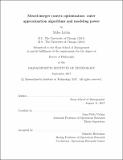Mixed-integer convex optimization : outer approximation algorithms and modeling power
Author(s)
Lubin, Miles (Miles C.)
DownloadFull printable version (1.555Mb)
Alternative title
Outer approximation algorithms and modeling power
Other Contributors
Massachusetts Institute of Technology. Operations Research Center.
Advisor
Juan Pablo Vielma.
Terms of use
Metadata
Show full item recordAbstract
In this thesis, we study mixed-integer convex optimization, or mixed-integer convex programming (MICP), the class of optimization problems where one seeks to minimize a convex objective function subject to convex constraints and integrality restrictions on a subset of the variables. We focus on two broad and complementary questions on MICP. The first question we address is, "what are efficient methods for solving MICP problems?" The methodology we develop is based on outer approximation, which allows us, for example, to reduce MICP to a sequence of mixed-integer linear programming (MILP) problems. By viewing MICP from the conic perspective of modern convex optimization as defined by Ben-Tal and Nemirovski, we obtain significant computational advances over the state of the art, e.g., by automating extended formulations by using disciplined convex programming. We develop the first finite-time outer approximation methods for problems in general mixed-integer conic form (which includes mixed-integer second-order-cone programming and mixed-integer semidefinite programming) and implement them in an open-source solver, Pajarito, obtaining competitive performance with the state of the art. The second question we address is, "which nonconvex constraints can be modeled with MICP?" This question is important for understanding both the modeling power gained in generalizing from MILP to MICP and the potential applicability of MICP to nonconvex optimization problems that may not be naturally represented with integer variables. Among our contributions, we completely characterize the case where the number of integer assignments is bounded (e.g., mixed-binary), and to address the more general case we develop the concept of "rationally unbounded" convex sets. We show that under this natural restriction, the projections of MICP feasible sets are well behaved and can be completely characterized in some settings.
Description
Thesis: Ph. D., Massachusetts Institute of Technology, Sloan School of Management, Operations Research Center, 2017. This electronic version was submitted by the student author. The certified thesis is available in the Institute Archives and Special Collections. Cataloged from student-submitted PDF version of thesis. Includes bibliographical references (pages 137-143).
Date issued
2017Department
Massachusetts Institute of Technology. Operations Research Center; Sloan School of ManagementPublisher
Massachusetts Institute of Technology
Keywords
Operations Research Center.